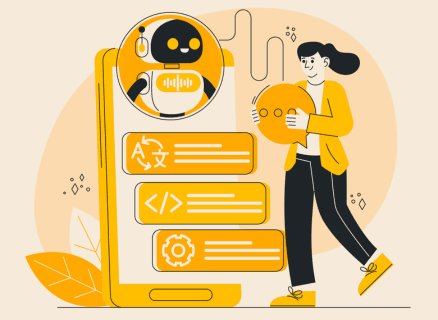AI tools
MVP development
Product strategy
Agile development
Software development
Data analytics
Security practices
DevOps practices
Building Scalable AI-Powered Service Apps: The Essential MVP Blueprint for Developers and Startups
Iliya Timohin
2024-11-18
To bring innovative AI-powered service apps to life, developers must first understand the foundational services that support AI development. AI development services provide the critical building blocks for any scalable solution, equipping teams with tools to process and analyze large datasets, train models, and deploy algorithms efficiently. When building a service app that leverages AI, the goal is to scale quickly while managing the complexity of adaptive functionalities. For startups, it’s essential to choose the right blend of AI development services. By leveraging frameworks like TensorFlow or PyTorch for deep learning, and cloud services such as AWS SageMaker or Google AI Platform, developers can build robust systems that will scale with demand. Additionally, services like automated data preprocessing, model optimization, and continuous integration can save time and resources, supporting more seamless development and deployment.

From Idea to MVP: Creating Your First AI-Powered Service App
Developing a minimum viable product (MVP) is a pivotal step for any startup aiming to validate ideas quickly. For AI-powered service apps, this stage involves focusing on core functionalities and iterating based on feedback. The MVP should showcase the AI model’s capability, whether it’s through recommendation algorithms, predictive analytics, or personalized user experiences.
Here’s a step-by-step approach to MVP creation:
- Define the Core Problem: Pinpoint the primary issue your app will solve. Is it improving user engagement, automating tasks, or providing insights?
- Select Essential Features: Start with the features that best illustrate the app’s value. AI features should be focused and deliver measurable benefits.
- Model Development: Train a model on a small, relevant dataset. The aim is to demonstrate effectiveness, not perfection.
- Build a Feedback Loop: Use user data and feedback to refine the AI model continually.
- Rapid Iteration: With an MVP in hand, leverage user feedback to quickly address issues and scale the app’s features.
Building a scalable MVP can mean the difference between a successful app and a stalled project. A well-developed MVP accelerates market entry, validates user interest, and identifies essential areas for improvement.
Managing Test and Production Environments for AI-Driven Development
Successful AI development requires distinct test and production environments, especially when dealing with complex models and data-heavy processes. This setup allows developers to trial and adjust models in a controlled environment before deployment, minimizing the risk of unexpected issues in production.
Here’s a structured approach to handling test and production environments for AI projects:
- Version Control: Each model version should be carefully documented and maintained with a tool like Git.
- Testing for Performance and Bias: Models in test environments should undergo rigorous testing to check for accuracy, performance, and fairness. Testing datasets and live production datasets often differ, so model adjustments may be required.
- Monitoring Production Models: Once in production, continuous monitoring helps detect drift and identify areas where the model requires retraining.
- Error Logging and Analytics: Real-time analytics and error logging are essential to understand user interactions, identify bottlenecks, and enhance stability.
Setting up efficient test and production environments is crucial for custom software development projects in the AI space. This practice fosters smoother transitions to production, ensuring the app can scale reliably under varying loads.
AI in Gaming: Use Case Insights for Service Apps and Beyond
The gaming industry demonstrates numerous ways AI can enhance user experiences and drive engagement, providing inspiration for other service app industries. Here are several key AI applications in gaming that offer useful insights:
- Personalized Gaming Experiences: Through AI-driven personalization, games can adjust difficulty levels, offer targeted rewards, and suggest in-game items that align with player behavior.
- Real-Time Adaptation: Games often use AI for adaptive learning, where in-game elements evolve based on player actions. Similarly, service apps can leverage adaptive learning to provide a more engaging user journey.
- Improved Player Retention: AI-driven analytics can help identify patterns that lead to user retention or dropout, allowing for preemptive engagement strategies.
By applying these AI-driven strategies, startups can enhance their own service apps, improving user satisfaction and retention. For example, adaptive learning in a financial planning app could tailor advice based on user habits, just as a game would adapt to a player’s preferences.
Custom Software Development and MVP Strategies for Startups
Custom software development offers the flexibility to tailor AI models to specific business needs, making it particularly valuable during the MVP phase. By developing custom software, startups can integrate AI capabilities that precisely align with their app’s requirements and growth projections. This approach ensures the scalability of both the technology and the business.
For an MVP, custom development enables startups to:
- Implement Specific AI Features: Customization allows for precise functionality, like personalized recommendations or real-time data processing.
- Optimize for Scalability: By planning for growth, custom solutions can ensure that as the user base grows, the app remains reliable and performs efficiently.
- Integrate Feedback Quickly: With a custom approach, developers have the flexibility to iterate on specific features without overhauling the entire app, allowing for faster responses to market feedback.
Custom development offers startups a strategic advantage, particularly in the AI-driven service app space. It establishes a strong foundation that can be scaled, iterated, and adapted to meet the demands of a growing user base.

Conclusion
For startups looking to create scalable, AI-powered service apps , the journey from concept to launch is filled with unique challenges and immense potential. From foundational AI development services and MVP strategies to managing test and production environments, each step is crucial to building a robust, user-centered application. Whether you’re inspired by adaptive AI in gaming or developing custom software for a specialized service, a strategic, well-organized approach will empower your team to build successful, scalable AI-powered service apps.